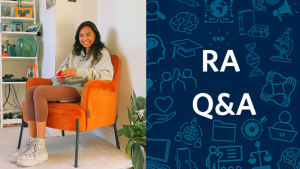

Angelina Hollihn has been interested in development psychology since her early undergraduate years. During her undergrad, Angelina worked as a Research Assistant at the Center for Infant Cognition, led by Kiley Hamlin. The Center for Infant Cognition explores the origins of social and moral thought from a developmental perspective. They examine the tendency to judge actions as good or bad, and how these social and moral evaluations influence our understanding of others’ future acts, their mental states, and their underlying personalities.
In her position as a Research Assistant, Angelina worked alongside a Ph.D. student to assist with data entry, running procedures for data collection, participant outreach, and communications. Angelina also worked part-time at Shaughnessy Point Grey Out-of-School Care, where she focused on program coordination for intermediate-aged children. Outside of work and school, you can find Angelina painting and spending quality time with her friends and family.
What motivated you to apply to work as an RA at the Centre for Infant Cognition?
I’ve always enjoyed development psychology throughout my undergraduate years. Janet Werker’s infancy development class inspired me to continue exploring the topic outside of the classroom. My previous research experience with the Sexual Health Lab also provided me with knowledge that I can apply to many different disciplines outside of sexual education, developmental psychology being one.
What intrigues you about research at this lab in particular?
I was interested in discovering more about how infants develop social awareness by differentiating between good and evil; learning when and how infants acquire these interpersonal skills and develop them through different research methods intrigued me. On top of that, I wanted to learn about the theory of mind and how it contributes to social-moral development in infants and children with autism. All of these interests pulled me to the Center for Infant Cognition.
Do you have advice for other students who want to get involved in research?
Keep persevering in your efforts to secure an opportunity! There is a high level of competition for research assistant positions, and many psychology students apply (as well as students from other disciplines). However, with determination, an opportunity will always present itself. The most difficult part is getting your first position. Afterward, your experience continues to grow as one opportunity leads to another. Make the most of your undergraduate years by beginning your applications at the earliest opportunity. Every year counts, and four years pass by faster than you can imagine.
Besides that, take whatever experience you can get your hands on and have fun with it. You don’t have to only work in labs directly related to your area of study. I have assisted in research on postpartum depression and moral development in infancy. Now, I am studying nursing at UBC, and none of my past research experience has directly contributed to my current academic path. However, both experiences have helped me become a stronger student, researcher, and better at time management. All of which are crucial to success in university.
What is your favourite part of working as an RA?
My favorite part was talking to the other RA’s and lab coordinators/managers. You learn a lot in the classroom, but you learn so much more about how the field works behind-the-scenes when you engage with hands-on practical work. By creating relationships with your colleagues, you gain a network of people who share similar interests and want to see you succeed.
How do you see this field of research changing in the next few months or years?
Research assistants in psychology are typically underpaid, or not paid at all. I believe that the psychology department at UBC is as successful as it is partially due to unpaid research assistants who dedicate much of their time and energy to the labs. I hope that psychology’s future will be more rewarding for undergraduate students. Research assistants are unionizing, which hopefully will reinforce certain expectations and standards within the labs.
I hope that the unionization of research assistants will create more job security and better working conditions for students. This will make it more appealing for students to become RAs, and in turn, increase their involvement in psychological research. Additionally, the expectation of payment for RAs will incentivize more students to take on these roles who would otherside miss out on these opportunities because they cannot take on time consuming and unpaid positions due to financial strains. So hopefully, the unionization of research assistants can provide students with pay which will open up this opportunity to more students.
If you are a student who is seeking hands-on research experience but is limited to taking on unpaid positions because of financial barriers, consider PSYC240: Research Experience for course credit. Learn more here.


